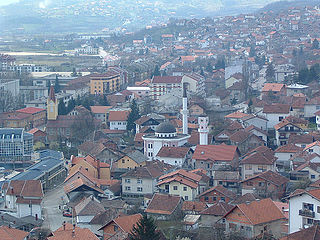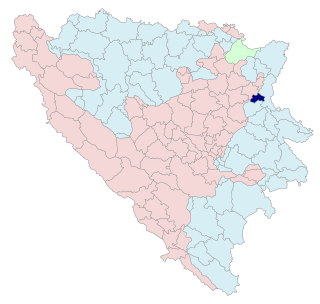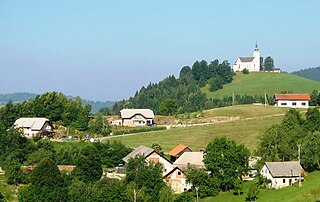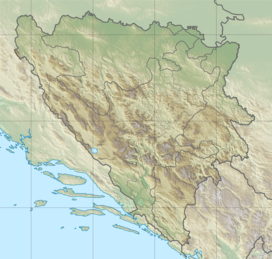
Doboj is a city located in Republika Srpska, an entity of Bosnia and Herzegovina. It is situated on the banks of the Bosna river, in the northern region of Republika Srpska. As of 2013, it has a population of 71,441 inhabitants.

Centar is a municipality of the city of Sarajevo, Bosnia and Herzegovina. It is located between the older parts of the city under Stari Grad, and the newer more modern parts of the city under the municipalities Novi Grad and Novo Sarajevo.
Crni Vrh means "black peak" in Bosnian-Croatian-Serbian. It may refer to:

The Srebrenica massacre, also known as the Srebrenica genocide, was the July 1995 genocidal killing of more than 8,000 Bosniak Muslim men and boys in and around the town of Srebrenica, during the Bosnian War. The killings were perpetrated by units of the Bosnian Serb Army of Republika Srpska (VRS) under the command of Ratko Mladić. The Scorpions, a paramilitary unit from Serbia, who had been part of the Serbian Interior Ministry until 1991, also participated in the massacre.

Osmaci is a village and a municipality located in eastern Republika Srpska, an entity of Bosnia and Herzegovina. As of 2013, it has a population of 6,016 inhabitants. There is also a small, uninhabited, part of Osmaci that is in Kalesija municipality.

The Ahatovići massacre was the mass killing of 47 captured Bosniak soldiers from the town of Ahatovići, in the municipality of Novi Grad, Sarajevo by the Army of Republika Srpska during the Bosnian War.

The Višegrad massacres were acts of mass murder committed against the Bosniak civilian population of the town and municipality of Višegrad during the ethnic cleansing of eastern Bosnia by Republika Srpska police and military forces during the spring and summer of 1992, at the start of the Bosnian War.

Črni Vrh is a dispersed settlement in the hills northwest of Polhov Gradec in the Municipality of Dobrova–Polhov Gradec in the Upper Carniola region of Slovenia. It includes many isolated farms scattered throughout the hills between Big Božna Creek to the south, Little Božna Creek to the northeast, Dog Plateau to the northwest, and Špilj Hill to the south-southeast.

Črni Vrh is a settlement in the hills south of Idrija in the traditional Inner Carniola region of Slovenia. It includes the hamlets of Zgornja Vas, Spodnja Vas, Trate, Trebče, and Zidiše.

Idrijski Log is a dispersed settlement on the right bank of the upper course of the Idrijca River in the hills south of Idrija in the traditional Inner Carniola region of Slovenia. In addition to the settlement of Idrijski Log itself, it also includes the hamlets of Koševnik and Na Pevcu.
Predgriže is a settlement northeast of Črni Vrh in the Municipality of Idrija in the traditional Inner Carniola region of Slovenia. The village includes the hamlets of Gornje Griže, Klavžar, Nagode, Na Vrhu, Smrekar, Spodnje Griže, and Žgavec.
The Čemerno massacre refers to the massacre of ethnic Serbs of the village of Čemerno, Ilijaš, in the Ilijaš Municipality, near Sarajevo, on 10 June 1992, during the Bosnian War.
Hajvazi is a village in the municipality of Osmaci, Bosnia and Herzegovina.

Donji Potočari is a village located in the municipality of Srebrenica, Republika Srpska, Bosnia and Herzegovina. As of 2013 census, the village has a population of 705 inhabitants.
The Glogova massacre was the mass murder of 64 Bosniak civilians by Serb forces, consisting of the Yugoslav People's Army (JNA), Bratunac Territorial Defence (TO), local police, and paramilitaries from Serbia, on 9 May 1992. Miroslav Deronjić, the head of the "Bratunac Municipal Board" established by the Serbian Democratic Party (SDS), was sentenced to 10 years in prison by the International Criminal Tribunal for the former Yugoslavia for ordering the massacre.
Liplje is a mountain village located in the municipality of Zvornik, Bosnia and Herzegovina, neighboring Snagovo. Within Liplje there are 14 settlements: Bajrići, Bećirovići, Čamlija, Hadžići, Husići, Jašići, Jošanica, Kadrići, Korin Brijeg, Liplje, Salihovići, Samari, Sultanovići and Velja Glava.

Snagovo is a mountain village in the municipality of Zvornik, Bosnia and Herzegovina. It is divided into Gornje Snagovo and Donje Snagovo.

The Snagovo massacre refers to the mass killing of 36 Bosnian Muslim civilians by Serbs on 29 April 1992 in the village Snagovo, located in the municipality of Zvornik, Bosnia and Herzegovina. The massacre occurred at the start of the Bosnian War.
The Bijeli Potok massacre refers to the mass killing of 675 Bosniak civilians by Serbs on 1 June 1992 in the settlement Bijeli Potok within the village Đulići, located in the municipality of Zvornik, Bosnia and Herzegovina. About 675 Bosniak men and boys, from the multiple villages around Zvornik, were separated from their families by Serb forces, and slaughtered within a week at Bijeli Potok and their bodies hidden in mass graves throughout the Drina Valley.
The Crni Vrh mass grave, discovered in 2003, is among the largest mass graves found in Bosnia and Herzegovina after the Bosnian War of the 1990's. It was discovered on the mountain Crni Vrh, and contained the remains of 629 Bosniak victims, killed by Serb forces in the villages surrounding Zvornik in 1992 and Srebrenica in 1995. The International Commission on Missing Persons said that the victims had originally been buried in other locations, but were reburied in the remote grave on Crni Vrh after the war in an effort to conceal the crimes.













